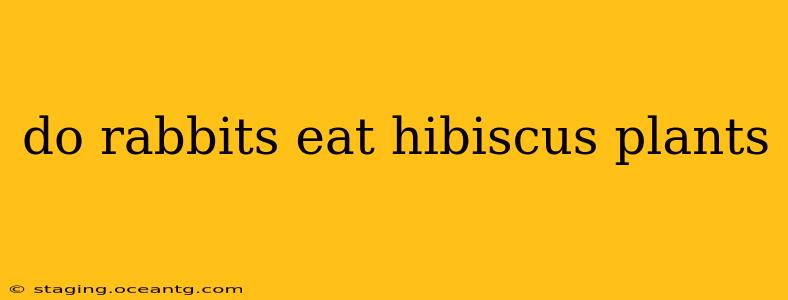Do Rabbits Eat Hibiscus Plants? A Comprehensive Guide
Hibiscus plants, with their vibrant blooms and lush foliage, are a common sight in gardens worldwide. But if you're a rabbit owner, or simply have rabbits frequenting your yard, you might be wondering: do rabbits eat hibiscus plants? The short answer is: it's complicated. While hibiscus isn't inherently toxic to rabbits, their reaction can vary, and it's generally best to err on the side of caution.
This article delves into the intricacies of rabbits and hibiscus, exploring the potential dangers and providing you with the knowledge to protect your plants and pets.
Are Hibiscus Plants Toxic to Rabbits?
No, hibiscus plants are not considered toxic to rabbits. However, this doesn't mean they are safe for consumption. Many plants, while not poisonous, can cause digestive upset or other problems in rabbits due to their sensitive digestive systems. The leaves, flowers, and stems of hibiscus plants contain compounds that might not be easily digested by a rabbit, potentially leading to discomfort.
What Happens if a Rabbit Eats Hibiscus?
The effects of a rabbit eating hibiscus can range from mild to severe. Minor issues might include:
- Digestive upset: This could manifest as diarrhea, gas, or bloating.
- Mild stomach ache: Rabbits might show signs of discomfort, lethargy, or loss of appetite.
In more severe cases, large quantities of hibiscus consumption could lead to:
- Severe diarrhea: This can lead to dehydration, which is a serious condition in rabbits.
- Bloat: Excessive gas buildup can be painful and even life-threatening.
It's important to note that the reaction will depend on several factors, including the amount of hibiscus consumed, the rabbit's individual sensitivity, and the overall health of the rabbit.
Why Shouldn't Rabbits Eat Hibiscus?
Even though hibiscus isn't toxic, it offers little nutritional value to rabbits. Their diet should primarily consist of high-quality hay, fresh vegetables, and a small amount of pellets. Introducing hibiscus into their diet disrupts this balance and risks digestive issues. It's always better to stick to known safe foods to maintain your rabbit's health and well-being.
What Plants Are Safe for Rabbits?
Rabbits can safely eat a variety of plants, but it's crucial to research thoroughly before introducing anything new to their diet. Some safe options include:
- Basil
- Parsley
- Mint
- Cilantro (in moderation)
- Dandelion greens
Always introduce new foods gradually and monitor your rabbit for any adverse reactions.
How to Prevent Rabbits from Eating Hibiscus
If you have hibiscus plants and rabbits, it's essential to take steps to prevent them from munching on your flowers:
- Physical barriers: Use fences, netting, or cages to protect your plants.
- Repellents: Some commercially available rabbit repellents might deter them, though effectiveness varies.
- Planting location: Place hibiscus plants in areas inaccessible to rabbits.
Regularly inspect your plants for any signs of damage. Early detection allows for swift action to protect your hibiscus and ensure your rabbit's health.
Disclaimer: This information is for educational purposes only and does not constitute veterinary advice. If your rabbit ingests hibiscus or shows any signs of illness, consult a veterinarian immediately. The information provided here is based on widely accepted knowledge and research; however, individual reactions can vary. Always prioritize the safety and well-being of your pet.
